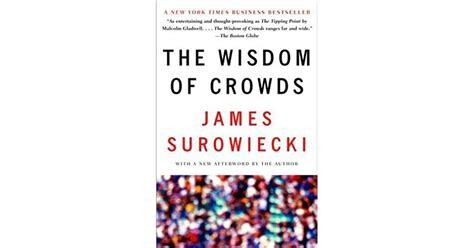The Wisdom of Crowds

The Wisdom of Crowds
By James Surowiecki
Anchor Books (2005)
Book Review
This book confirms what I have believed for more than two decades: namely that groups (given the right circumstances) always make better decisions than individual experts.
The book opens by describing the famous 1906 experiment by Darwinian eugenicist Francis Galton which unwittingly disproved his own theory (that only a “well-bred” few were capable of governing) in which he asked fairgoers to guess the weight of an ox.*
Surowiecki describes three types of problems groups are asked to solve:
Cognition problems – those that have or will have definitive solutions (who will win the Super Bowl, where’s the best place to build a new swimming pool)Coordination problems – those that require people to coordinate their behavior others (students looking for the best parties to crash, drivers seeking to avoid freeway congestion)Cooperation problems – getting diverse people to work together even when individual self-interest dictates they shouldn’t (paying taxes, dealing with pollution).Groups perform best in solving cognition problems. According to Surowiecki the value of expertise in Western society is over-rated. Two specific examples he gives are investment advisors, who (except for Warren Buffet) consistent fail to outperform the market and psychologists, who are worse at predicting violent behavior than the general public.
The Wisdom of Crowds stipulates that for groups to make good decisions they must meeting the following criteria:
They have rules to maintain order and coherence.They’re diverse (to enhance perspective and preserve independence of opinion).They’re not too big.They’re independent – the best way for a group to be smart is to encourage each person to be as independent as possible.They don’t expect people to modify their individual position to make everyone else happy.The books gives numerous examples of groups that have made good decisions and a few that have made disastrous ones. My favorite example is the old TV game show Who Wants to Be a Millionaire, in which contestants who asked the studio audience for help had a 91% chance of being right (in contrast to a 65% chance when they asked an expert).
The worst decision in the book is the Mission Management Team decision (not to investigate potential heat shield damage) leading to the 2003 Columbia shuttle disaster. According to Surowiecki, it was based on a common error (failing to preserve member independence) small groups make in solving cognition problems.
Examples of effective group work in solving coordination problems are the Linux open source operating system** and the decentralized assembly lines adopted by most US car manufacturers.
Examples of effective group work in solving cooperation problems are paying taxes and keeping sidewalks free of snow. Despite all their anti-tax rhetoric, Americans are much less likely than European to evade paying tax.
The book includes an extensive discussion on the absence of good group governance in US corporations, which Surowiecki feels has a negative effect on their productivity. I found this section less useful, in that it makes some naive assumptions about Wall Street being a “free market.”
For example, this section focuses mainly on manufacturing without mentioning that the preponderance of US manufacturers moved their plants overseas between 1970 and 2000. Likewise it makes no mention (in discussing Wall Street bubbles) of the role of the Federal Reserve in flooding Wall Street with cheap credit nor of corporate CEOS buying back company shares to artificially increase share prices.
*The group average was only off by one pound,
**First introduced in 1991 by Linus Torvalds, the software code on which Linux operates is freely accessible to all users and open to suggestions for improvement via the Free Software Foundation.
The Most Revolutionary Act
- Stuart Jeanne Bramhall's profile
- 11 followers



